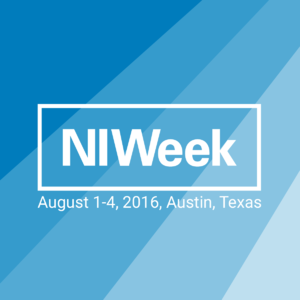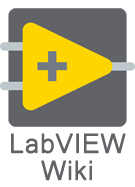NIWeek 2016
Appearance

Keynote Sessions
Videos Coming Soon
Technical Sessions
Advanced Users Track
Videos Coming Soon
- Tuesday, August 2nd
- The answer to this question may not be so clear. Many seasoned programmers are surprised that some of the most advanced LabVIEW programmers use global variables for certain applications. At this session, explore some of those applications, examine the alternatives to globals, and learn when globals are the most effective solution. Audience participation is strongly encouraged at this session.
- Project Templates: Making the Most of Code Reuse by Becky Linton, Senior Systems Engineer, VI Engineering, Inc. (forum|slides)
- Explore the benefits of using project templates including increased efficiency through code reuse as well as the coherence established when all members of a development team use similar code. Hear LabVIEW Champions discuss their favorite templates, including some they created and some from the LabVIEW Community.
- Get Your RegExercise: Text Processing in LabVIEW by Darin Kinion, President, SpoolWerks (forum)
- Even for graphical programmers, text processing is an integral part of many applications. At this session, explore the many tools that LabVIEW provides (Simple Matching, Regular Expressions, Search and Replace, XML and JSON parsing) and gain insight on when to use these tools. Focus on demystifying RegExes and learn how to unleash their power on some seemingly difficult tasks. Finally, examine the importance of wisely choosing a data format in the beginning to mitigate common postprocessing problems.
- Wednesday, August 3rd
- The Right and Wrong Way to Use Settings in LabVIEW Classes by Casey Lamers, Senior Controls Engineer, Phoenix Nuclear Labs, LLC (forum|slides)
- LabVIEW classes present an array of choices to the developer, including opportunities to get things right and get things wrong. At this session, receive a thorough introduction to several of the most important settings, such as Access Scope, Must Override, Transfer Must Override to descendants, and Must Call Parent, and examine the various reentrancy settings. Hear an explanation of each setting and explore concrete examples that demonstrate the benefits of using the correct settings and the costs of using the incorrect ones.
- How Applying Agile Object-Oriented Design Principles Changes Designs and Code by Dmitry Sagatelyan, CEO, Arktur Technologies (forum)
- Hear from Dmitry Sagatelyan, who has been using agile object-oriented (OO) design principles (aka SOLID principles) on his LabVIEW projects for the last five years. This led to leaner and more scalable LabVIEW applications and profoundly changed his software development mindset. At this session, explore the agile OO design philosophy and SOLID principles and get an overview of a vintage motor yacht monitoring system architecture and code.
- Quality management is integral in certain fields that are natural fits for LabVIEW applications (automotive, aerospace, and so on). As part of their quality management programs, companies try to obtain ISO 9000 accreditation. This can be difficult and costly, so companies often must decide if the benefits outweigh the costs. At this session, learn about the experiences of an established company that obtained ISO 9000 accreditation, including the time and work involved and the short- and long-term payoffs.
- XNodes: Treasures of Reuse in LabVIEW’s Attic by Brian Hoover, Test Software Architect, Samsung SDIA (forum|slides|demos)
- Take a peek into one of the dark corners of LabVIEW’s attic to explore XNodes. Review the more familiar concepts of XControls and scripting before diving into the definition of XNodes as well as the pros and cons of using them in your code. Even in situations where XNodes are not practical, their underlying scripting concepts can be tremendous time savers and have a profound impact on coding efficiency.
- Code Optimization and Benchmarking by Christian Altenbach, Research Ophthalmologist, UCLA Stein Eye Institute and Edwin Dickens, Test Systems Engineer, DISTek Integration Inc. (forum|slide pt. 1)
- Examine some of the key concepts behind writing optimized LabVIEW code. To quantify “optimization,” you must first understand how to benchmark timing and memory usage. Then this session features examples to help you review inplaceness, the hidden costs of operations, parallelization, and existing compiler optimizations. Lastly, discover the pitfalls of optimizing an implementation of the wrong algorithm.
- Thursday, August 4th
